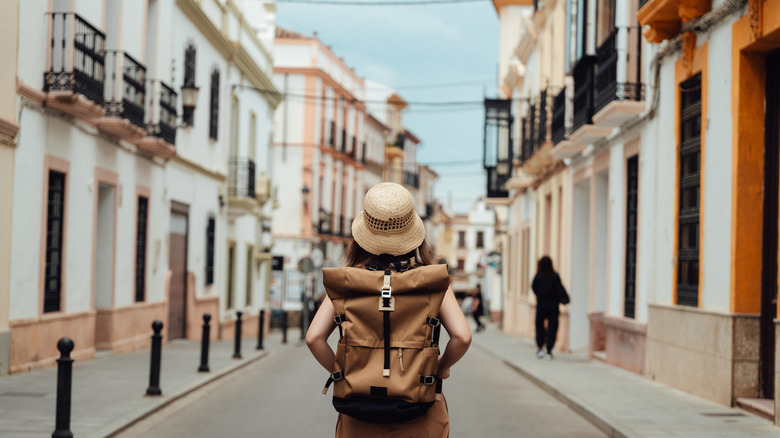Rick Steves Explains Why Tourists Should Avoid Flirtatious Strangers While Abroad
Meeting new people while traveling is part of the adventure — and a flirtatious fling can feel like the start of a great romance, no strings attached. Romantic stories abroad — both fictional and real — are everywhere, from "Emily in Paris" to "Roman Holiday" and "Eat, Pray, Love." Plus, engaging with locals and fellow travelers alike can enrich your experience, offering new perspectives, cultural insights, and unforgettable memories. Travel expert Rick Steves even admits he feels a trip falls "flat" if he doesn't connect with people while on the road. But while whirlwind romances make for great storytelling, and local connections are an important part of the journey, the reality can be more complicated. In his blog, Steves warns about a common European scam known as "the attractive flirt," in which charming strangers use flirtation as a tactic to swindle unsuspecting tourists.
Here's the gist of the con: You're traveling solo when a good-looking stranger approaches — maybe while you're sipping an espresso at a sidewalk cafe or wandering past a centuries-old duomo, admiring the architecture. Maybe you're heading back to your hotel after a long day, shopping bags in hand. You're polite, so you stop to chat. The stranger seems friendly and charming, and soon, they invite you for a drink at a nearby bar or restaurant. It's a public space, just around the corner — seems harmless enough. It even feels like the kind of spontaneous moment that makes travel so exciting.
At first, it's fun. You're laughing, enjoying the conversation, maybe even thinking you've made a new international friend. But then the bill arrives, triple what you expected, and suddenly, your "new friend" has forgotten their wallet, lost their credit card, or is conveniently out of cash. Now, they're urging you to cover the whole thing.
Different versions of the attractive flirt scam
According to Rick Steves, the "attractive flirt" is just one variation of a scam targeting tourists, especially those traveling solo. Sometimes, the scammer poses as a fellow tourist looking for help and other times as a friendly local who seems to want to show you around. These situations are designed to lure you somewhere for a drink or food, and before you know it, you're stuck with an outrageous bill. Quite often, the bar or cafe is in on the scam, recouping the benefits, and may employ security to block exits and pressure victims into paying. If you do genuinely hit it off with someone new, Steves recommends you choose the location instead of going where they suggest.
Travelers on the Reddit thread r/Scams reported similar experiences. One user, u/Walleyevision, described attractive bar workers coaxing tourists into a bar, only to stiff them with a big tab, while u/iluvecookies4616 recounted a champagne scam in Athens: after being charmed into ordering two bottles by a woman at the bar, they were handed a bill for 1,800 euros. Meanwhile, u/Mean-Dragonfly shared an encounter in a park where a man approached someone, asking if they were the person whom he'd been texting. Upon "realizing" they weren't this person, he tried to recruit them as a replacement for his date, who had apparently ghosted him.
Traveling solo is a mental health boost, and celebrities like Tracee Ellis Ross are helping to normalize and celebrate solo vacations. But avoiding scams like these will make the most of your experience. Before your next trip, take time to research common tourist scams and how not to feel lonely while on the road alone, while finding ways to forge genuine connections with strangers. "I want my readers to meet and get to know Europeans," Steves writes, "but watch out for chance encounters on the street."

